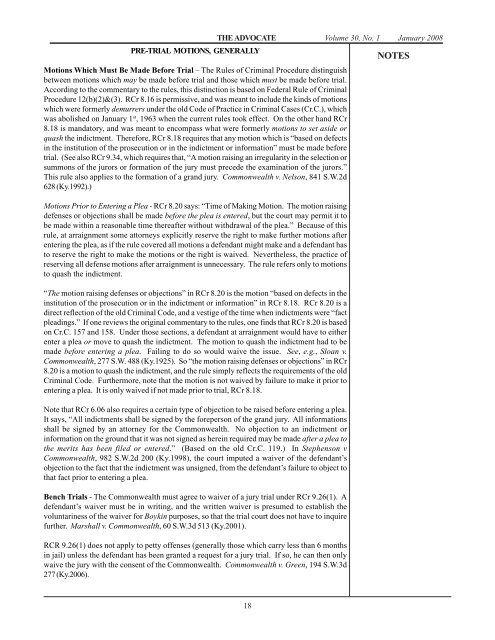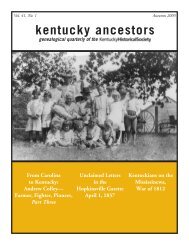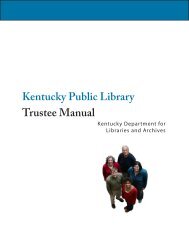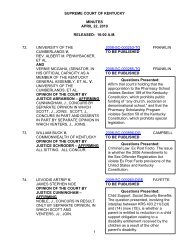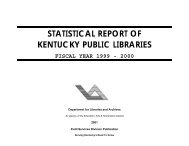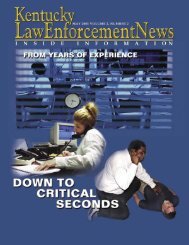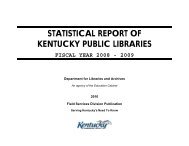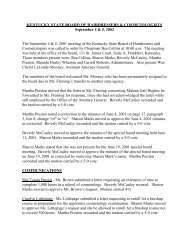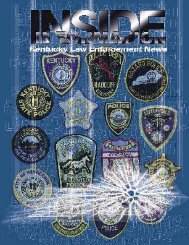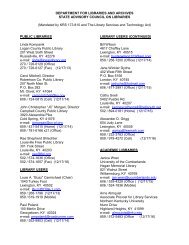Jan08 Advo.pmd - e-archives Home
Jan08 Advo.pmd - e-archives Home
Jan08 Advo.pmd - e-archives Home
You also want an ePaper? Increase the reach of your titles
YUMPU automatically turns print PDFs into web optimized ePapers that Google loves.
PRE-TRIAL MOTIONS, GENERALLY<br />
THE ADVOCATE Volume 30, No. 1 January 2008<br />
Motions Which Must Be Made Before Trial – The Rules of Criminal Procedure distinguish<br />
between motions which may be made before trial and those which must be made before trial.<br />
According to the commentary to the rules, this distinction is based on Federal Rule of Criminal<br />
Procedure 12(b)(2)&(3). RCr 8.16 is permissive, and was meant to include the kinds of motions<br />
which were formerly demurrers under the old Code of Practice in Criminal Cases (Cr.C.), which<br />
was abolished on January 1 st , 1963 when the current rules took effect. On the other hand RCr<br />
8.18 is mandatory, and was meant to encompass what were formerly motions to set aside or<br />
quash the indictment. Therefore, RCr 8.18 requires that any motion which is “based on defects<br />
in the institution of the prosecution or in the indictment or information” must be made before<br />
trial. (See also RCr 9.34, which requires that, “A motion raising an irregularity in the selection or<br />
summons of the jurors or formation of the jury must precede the examination of the jurors.”<br />
This rule also applies to the formation of a grand jury. Commonwealth v. Nelson, 841 S.W.2d<br />
628 (Ky.1992).)<br />
Motions Prior to Entering a Plea - RCr 8.20 says: “Time of Making Motion. The motion raising<br />
defenses or objections shall be made before the plea is entered, but the court may permit it to<br />
be made within a reasonable time thereafter without withdrawal of the plea.” Because of this<br />
rule, at arraignment some attorneys explicitly reserve the right to make further motions after<br />
entering the plea, as if the rule covered all motions a defendant might make and a defendant has<br />
to reserve the right to make the motions or the right is waived. Nevertheless, the practice of<br />
reserving all defense motions after arraignment is unnecessary. The rule refers only to motions<br />
to quash the indictment.<br />
“The motion raising defenses or objections” in RCr 8.20 is the motion “based on defects in the<br />
institution of the prosecution or in the indictment or information” in RCr 8.18. RCr 8.20 is a<br />
direct reflection of the old Criminal Code, and a vestige of the time when indictments were “fact<br />
pleadings.” If one reviews the original commentary to the rules, one finds that RCr 8.20 is based<br />
on Cr.C. 157 and 158. Under those sections, a defendant at arraignment would have to either<br />
enter a plea or move to quash the indictment. The motion to quash the indictment had to be<br />
made before entering a plea. Failing to do so would waive the issue. See, e.g., Sloan v.<br />
Commonwealth, 277 S.W. 488 (Ky.1925). So “the motion raising defenses or objections” in RCr<br />
8.20 is a motion to quash the indictment, and the rule simply reflects the requirements of the old<br />
Criminal Code. Furthermore, note that the motion is not waived by failure to make it prior to<br />
entering a plea. It is only waived if not made prior to trial, RCr 8.18.<br />
Note that RCr 6.06 also requires a certain type of objection to be raised before entering a plea.<br />
It says, “All indictments shall be signed by the foreperson of the grand jury. All informations<br />
shall be signed by an attorney for the Commonwealth. No objection to an indictment or<br />
information on the ground that it was not signed as herein required may be made after a plea to<br />
the merits has been filed or entered.” (Based on the old Cr.C. 119.) In Stephenson v<br />
Commonwealth, 982 S.W.2d 200 (Ky.1998), the court imputed a waiver of the defendant’s<br />
objection to the fact that the indictment was unsigned, from the defendant’s failure to object to<br />
that fact prior to entering a plea.<br />
Bench Trials - The Commonwealth must agree to waiver of a jury trial under RCr 9.26(1). A<br />
defendant’s waiver must be in writing, and the written waiver is presumed to establish the<br />
voluntariness of the waiver for Boykin purposes, so that the trial court does not have to inquire<br />
further. Marshall v. Commonwealth, 60 S.W.3d 513 (Ky.2001).<br />
RCR 9.26(1) does not apply to petty offenses (generally those which carry less than 6 months<br />
in jail) unless the defendant has been granted a request for a jury trial. If so, he can then only<br />
waive the jury with the consent of the Commonwealth. Commonwealth v. Green, 194 S.W.3d<br />
277 (Ky.2006).<br />
18<br />
NOTES


